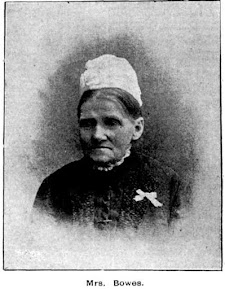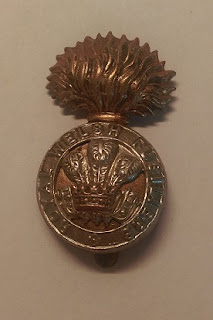Accidents do happen!
As you meander amongst the headstones in the older part of Rookwood there are many graves that mention -"accidently drowned, accidently killed etc." and it reminds us of a time when Occupational Health and Safety did not exist. Employment, especially the manual work that attracted a higher wage, came with many risks to health as well as and life and limb.
Today's blog is about a slightly different kind of accident, one still quite shocking but one that is a little more unusual.
WILLIAM MOON
William Moon was born in Brightling Sussex England, on the 5th of November 1829, one of sixteen children to Jesse Moon and his wife Ann. Remarkably only two children died in infancy, the rest living to adulthood.
His father, Jesse, came to Australia with his family, his wife and eight children, as an assisted immigrant in 1839 onboard the vessel the Prince Regent. William was ten years of age, and the family settled into life in the Redfern area.
William married Harriet Baker in 1853 and together they went to have seven children, one dying in infancy.
He took up a position as a gardener and loved a spot of professional clay pigeon shooting.
William was a well-known person in the Waterloo area and became an Alderman on the local council from 1863-1871 and during that time he served two periods as Mayor of Waterloo during 1868 and from 1870-1871. Other family members served as Aldermen for Waterloo Council. Thomas was a mason and builder and worked on the foundation of The Great Synagogue in Elizabeth Street, Sydney which was completed in 1878. He also served as Mayor in 1875. Another brother, David, also a mason and builder, served as an Alderman on the Council.
William Moon family plot in Rookwood - find-a-grave
In late 1870, William and his family moved to Sandringham near Sans Souci on a temporary basis and had been residing there for about four months. On the 29th of March 1871 William and his 13-year-old son George went to an area known as Wheeny Creek for a bit of duck shooting. A Mr. Davis, a Mr. York and a young lad were in another boat and the party sailed forward in order to claim some ducks. After a while William and George decided to return home after a successful shoot resulting in nine ducks and were about a kilometre ahead of the other boat.
At that time George saw another duck in the water and William said he would take a shot at it. He reached his arm over from where he was sitting and held the gun by the muzzle and drew it along. George had his eyes transfixed on the duck when he heard his father's gun go off and his father shout "Oh George I am shot". George turned around and observed his father still seated and went to him holding up his hand to see how bad an injury it was. George saw blood spurting from what he believed to be his father's right side and William then fell back on to the tiller. George asked his father to get up while he steered to shore, William simply laid down on the side of the boat.
George frantically called to the other boat, but they couldn't hear him, so he started shaking his coat to get their attention. The Davis party pulled up alongside and lifted William into their boat and brought him back to shore, but he was dead by the time they arrived.
At the inquest it was advised that William was a man with many years' experiences in the handling of guns and was of a sober disposition. It appeared that William reached for the gun, and it went off before he had time to raise it, going off as he was drawing it towards himself, with a breeze going strong enough to roll the boat around.
Dr Sedgwick stated that being called to see the deceased he found a large wound an inch and a half in diameter, taking an upward and inward direction commencing at the seventh rib on the left side, carrying away the sixth and seventh ribs, a portion of the base of the heart, and entering the left lung. The Doctor had extracted some the shot and portions of the ribs and found that the injury done to the heart and lungs was extensive and owing to the close proximity of the gun to the deceased, death would have been very quick.
After much questioning of the thirteen-year-old George, the jury returned a verdict of "Accidental death".
What happened next you ask? Well, I have been hard pressed to find much information about the young George and how he fared but William's wife Harriet, needing the provide for school age children remarried in 1872 to Edwin Godfrey but died in 1889 aged 56 years. She is buried with William in the Old Methodist area of the Cemetery.
The burial plot is quite a large one, but it is the inscription on the headstone that makes one look twice
WILLIAM MOON
who was so suddenly cut down in the vigour
of life, while engaged in that pleasure
to which he was so devoutly attached.
Leaving a wife and 7 children to mourn his loss.
29th March 1871. Aged 38 years.
Close up of the inscription on the headstone - find-a-grave
As you can understand, the ordinary person reading that inscription would never associate William's death with duck shooting!
They say accidents happen, many with guns, and even a person with complete knowledge of the handling of firearms can make an error of judgement.
We all like to think when our time is up that we will leave this earth in a gentle way perhaps just going to sleep permanently. At least William was involved in a sport that he loved to do but what a terrible shock for young George.
The references I used for today's blog were ancestry.com; City of Sydney - Sydney's Aldermen, various newspaper reports from Trove and the report on the coroner's inquest taken from The Sydney Morning Herald Friday 31st March 1871 as well as other google searches.
If you have any insights, further information or comments about this blog today please add them below or at the group Facebook page found under
Rookwood Cemetery Discoveries
or send me a personal message via
lorainepunch@gmail.com
Be careful out there
Until next week





Comments
Post a Comment